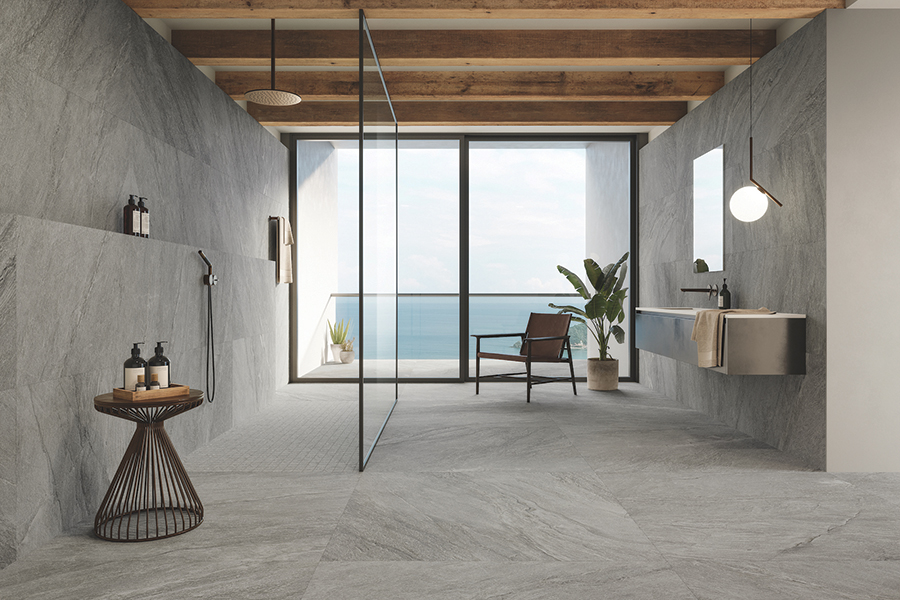In an era of increasing awareness around hygiene issues, The Tile Association is promoting the hygiene advantages of correctly installed tiled surfaces, especially in commercial kitchens and food preparation environments. Ceramic tiled surfaces are entirely safe to install and use in hygiene sensitive installations, particularly if large format glazed or porcelain tiles are used with epoxy grouted joints.
Tile manufacturers have developed new tiles with anti-bacterial or anti-microbial additives. Anti-bacterial self-cleaning tiles provide the strongest protection and act against the most common bacteria. They work best in the presence of natural or artificial light and are suitable for a wide range of different applications.
Ceramic glazed surfaces and porcelain tiles are more or less impervious, with less than 0.5 per cent porosity, as are epoxy grouts, to the extent that some have been approved for use in nuclear power stations, since they can be decontaminated from radioactivity.
Provided British Standards are followed during installation, tiled surfaces are very safe. The best way to be sure of that is to choose a TTA-accredited member and you will then know that the tile fixer is fully trained, skilled to the appropriate level and certified by TTA.
The relevant standards he or she will be working to are BS EN 14411:2012, which covers the specification of ceramic wall and floor tiles, including their resistance to abrasion and chemicals. BS 5385-4:2015 includes a code of practice for the design and installation of ceramic and mosaic tiling in specific conditions. This gives recommendations on design considerations and on the installation of ceramic wall and floor tiling and mosaics in situations where there are specific environmental or functional requirements, e.g. sterile conditions, wet areas, and conditions that are potentially detrimental to either or both the installation or the background, such as chemical attack.
The grouts used should conform to BS 13888, which covers the specification, conformity and evaluation of all types of tile grout.
Fully vitrified tiles and epoxy resin-based grouts are not porous and have been recommended in hygienic applications such as commercial kitchens for many years. The use of tiles and epoxy grout is consistent with Guidelines published by Campden & Chorleywood Food Research Association, which, following its own research, concluded that ‘the grouted joints and texture did not compromise the cleanabilities of tiled surfaces’. The research also states that the cleanability of tiled surfaces with grouted joints is not compromised over that of tiles alone.
Grouted areas in a tiled surface will normally only amount to about 3 per cent of the total area in any case and, if epoxy grouts are used, this surface will be totally impervious and will not harbour bacteria, provided an appropriate cleaning regime is employed.
TTA also promotes tiles as a sustainable choice – and has in fact identified 41 reasons why tiled surfaces are sustainable. These benefits include durability and longevity, recyclability, inert composition, health and wellness, thermal mass and fire resistance.
Ceramic tiled surfaces can safely be cleaned at temperatures well in excess of 60°C, since tiles are fired to temperatures far above that during the manufacturing process, e.g. porcelain which is fired at 1260ºC. This means that tiles are a good solution in an environment where boiling liquids might accidentally get spilt on them.
In wet areas, or where an aggressive cleaning regime is required, such as in hygiene sensitive environments, there is a further benefit of ceramic tiled surfaces – a liquid-applied or sheet waterproofing membrane can be installed behind the tiles as a tanking system. If a tile is damaged then the background, when tanked, remains fully protected and the waterproofing element is maintained.
Another area that the TTA has been working on is that of slip resistance of tiled surfaces, and it offers a technical publication on ‘Slip Resistance of Hard Flooring’. No ceramic tiles are inherently slippery when clean and dry, but the slip resistance of any type of floor covering can significantly reduce if it becomes contaminated by any form of lubricant, such as water or dust, depending upon the floor’s surface texture and footwear used. Ceramic tiles are available with a range of textures to improve slip resistance in wet environments, such as swimming pool surrounds, food processing areas, breweries and similar locations.
www.tiles.org.uk
The Tile Association promotes hygiene benefits of ceramic tiled surfaces for commercial environments
Please click to view more articles about
Sector Focus

